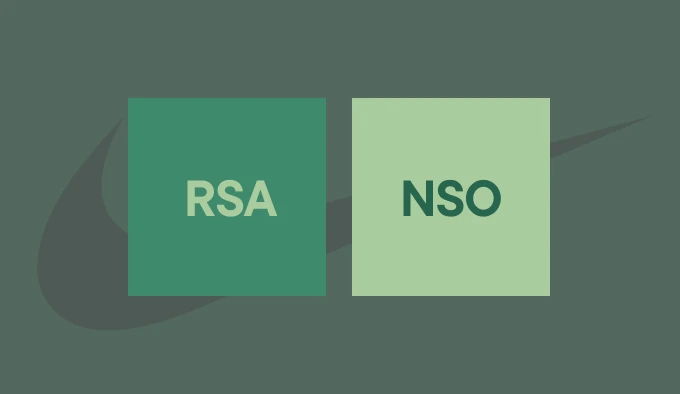Every summer, Nike E-Brand employees must make the difficult decision to choose which percentage of their stock compensation will come in the form of Restricted Stock Awards (RSAs) and which percentage will come in the form of non-qualified stock options (NSOs). While both types of awards share similar characteristics, there are important differences that require consideration. Choosing the one best for you can make a significant impact on your overall financial plan’s success. Below are some of the basics of RSAs and NSOs, as well as an outline of who may benefit from each choice.
What Are Restricted Stock Awards (RSAs)1?
RSAs function similarly to a bonus that is paid out in shares of stock instead of cash. The actual amount you receive depends directly on how the stock performs. Once your RSA shares vest (typically a portion on the anniversary of the grant date), the released value is generally considered income for tax purposes (again, just like a cash bonus). You can hold the released shares or sell them, and given your hold time, short- and long-term capital gains rates apply. Unlike NSOs, there is no expiration period. We generally advise clients to sell RSAs once they vest and diversify to other investments as there are more advantageous ways to capitalize on the future upside on the stock (Employee Stock Purchase Plan and NSOs are two examples).
Why Should I Choose RSAs?
Diversification: As mentioned above, selling vested RSAs and investing the proceeds can be a good way to reduce concentration risk and diversify your investments.
Upcoming cash needs: Vested RSAs can be sold, and the cash proceeds used for upcoming expenses (college tuition, money toward a real estate purchase, debt reduction, etc.).
Protection: If the underlying stock price goes down, your RSAs may be worth less than expected at vesting but will still provide value. In comparison, NSOs could hypothetically expire worthless if the stock price is below the strike or grant price at the end of its term, which can be accelerated by a change of employment.
What Are Non-Qualified Stock Options (NSOs)2?
Stock options share a similar vocabulary with RSAs. There is a granting of shares, a grant date, and a vesting schedule. (For Nike stock options, the award typically vests 25% each year over 4 years on the first anniversary of the grant date.) The big difference between the two is the existence of a strike price.
As the granted shares vest, if your vested shares have a stock price above the strike price, you can exercise the vested shares (buy them at the grant price), sell them at current market value, and keep the difference. The difference between the stock price and the strike price is called the “bargain element,” which is taxed at ordinary income rates. It is usually optimal to hold NSOs for as long as possible; however, be careful, in contrast to RSAs, NSOs do have an expiration date, which occurs 10 years after the grant date for Nike stock options.
Why Should I Choose NSOs?
Longer time horizon: Assuming company success, NSOs appreciate in value the longer the stock is held. Having a longer investment time horizon allows you to exercise them thoughtfully, instead of needing to exercise at a suboptimal time to meet cash needs.
Comfortable with risk: As mentioned above, NSOs can potentially expire “out of the money,” meaning they expire worthless. Because of the nature of stock options, there is potential for higher returns than those associated with RSAs. The key is to make sure you are comfortable with the risk/return trade-off.
Nearing retirement: NSOs receive special treatment at Nike and can sometimes be held beyond the date of retirement assuming age and work experience requirements are met. However, any RSAs held at Nike expire upon retirement.
We’re Here to Help
Unfortunately, we do not have a crystal ball that will tell us what the exact stock price will be in the future. Like many things in finance, there is no one-size-fits-all approach to deciding the proper mix of RSAs and NSOs. It’s important to evaluate your overall financial picture and make the decision that gives you the best chance of reaching your financial goals.
At JGP Wealth Management, we’ve been helping Nike executives maximize their employee benefits for decades. If you would like to discuss how to best handle your RSAs and NSOs, please give us a call at 503-446-6450. We’d love to hear more about your situation and offer advice on how you can optimize your Nike benefits and prepare for a secure retirement.
This commentary in this email reflects the personal opinions, viewpoints and analyses of the JGP Wealth Management, LLC employees providing such comments, and should not be regarded as a description of advisory services provided by JGP Wealth Management, LLC or performance returns of any JGP Wealth Management, LLC Investments client. The views reflected in the commentary are subject to change at any time without notice. JGP Wealth Management, LLC manages its clients’ accounts using a variety of investment techniques and strategies, which are not necessarily discussed in the commentary. Investments in securities involve the risk of loss. Past performance is no guarantee of future results. No advice may be rendered by JGP Wealth Management, LLC unless a client service agreement is in place. Please contact us at your earliest convenience with any questions regarding the content of this presentation and how it may be the right strategy for you. For actual results that are compared to an index, all material facts relevant to the comparison are disclosed herein and reflect the deduction of advisory fees, brokerage and other commissions and any other expenses paid by JGP Wealth Management, LLC’s clients. An index is a hypothetical portfolio of securities representing a particular market or a segment of it used as indicator of the change in the securities market. Indexes are unmanaged, do not incur fees and expenses and cannot be invested in directly.
________________
(1) Nike has been moving away from Restricted Stock Units (RSUs) to RSAs, but you may still hear mention of RSUs. These awards function very similarly, the biggest difference being that with RSAs, actual stock is issued at granting. This means you typically receive dividends on shares granted.
(2) The other common stock options are Incentive Stock Options (ISOs), which are considered “qualified” stock options. Because Nike only offers NSOs at this time, we’ll be focusing on those.







